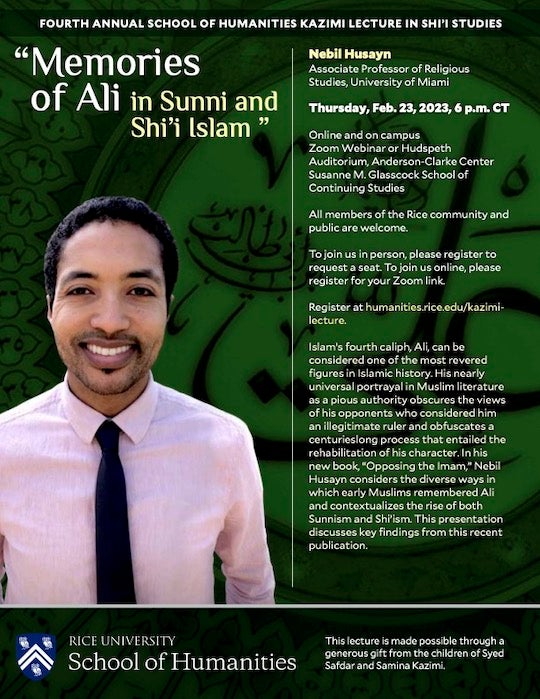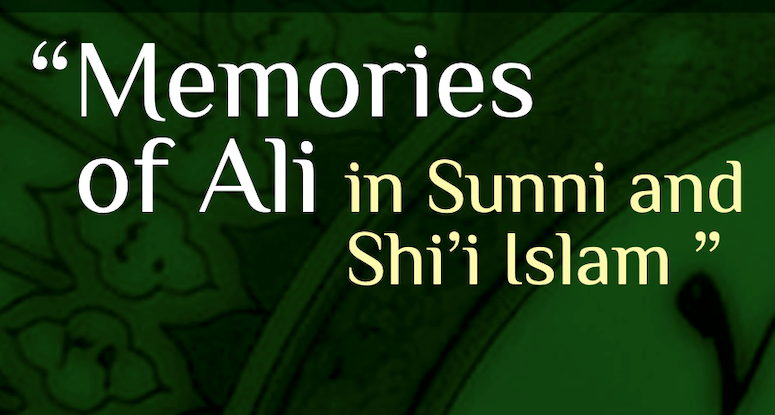Whether you’re a Muslim, a scholar of religion or simply someone interested in the lessons history can teach us about contemporary debates around religion and politics, Rice’s fourth annual Kazimi Lecture in Shi’i Studies Feb. 23 by Nebil Husayn is sure to provide plenty to ponder.
An associate professor of religious studies at the University of Miami, Husayn will focus his lecture — “Memories of Ali in Sunni and Shi’i Islam” — on the figure of Ali, Islam’s fourth caliph, and how revisiting the way Ali’s contemporaries considered and wrote about him can convey a powerful lesson about the ebbing and flowing ways history remembers even leaders who are perceived positively in the present day. Husayn has written at length about these topics in his recently published book “Opposing the Imam.”

Each year, the School of Humanities invites a prominent religious scholar or historian whose research touches on the complexities of Shi’i Islam to campus for the Kazimi Lecture Series, made possible by a generous endowment gift from the children of Syed Safdar and Samina Kazimi.
Muslims disagreed about the person best suited to succeed Muhammad as caliph, with Shi’i Muslims supporting Ali and Sunni Muslims favoring other candidates. Even though the disagreement still divides Shi’is and Sunnis, Ali is generally revered and looked upon positively by most contemporary Muslims, regardless of their religious tradition, Husayn explained.
“How does someone go from basically being a villain to someone who’s revered as a saint?” Husayn asks. “What were the processes that went into how a religious community can understand someone in their history this way? I look at the different ways in which theology is developed over centuries, the ways in which Muslims remember heroes and villains, and the ways that they rehabilitate characters or reinvent them. It’s a process of evolution.”
Husayn earned his Ph.D. in Near Eastern studies from Princeton University and his master’s in Arabic and Islamic studies from Harvard University. At the University of Miami, Husayn’s research explores authoritarianism in the Middle East, debates on the caliphate and the development of Islamic thought. He has received a Fulbright award as well as the University of Miami Fellowship in the Arts and Humanities.
Looking ahead to his lecture, Husayn is excited to speak about his years of research in a way that can help a contemporary audience better understand how examining the ways histories are written and the way prominent leaders of all stripes are often discussed in wildly disparate fashions as time goes by can teach us that current debates around political and religious polarization are far from uncharted territory.
“In Islamic history, there was a polarization in the community on who should rule or who should lead the state. Polarization in American politics today is reminiscent of seventh-century Arabia,” Husayn said. “That polarization led to competing narratives about who was a righteous leader and who was considered illegitimate.
“Now, as I’m writing 1,400 years after what happened in Islamic history, I find these competing narratives. So let us not be surprised if 500 years from now, researchers studying the history of American politics find these competing narratives regarding our best and worst presidents,” Husayn continued. “They’re going to find parallels sifting through news outlets and biographies written for a conservative base versus those written for a liberal or progressive audience that revered some presidents and disliked others.”
The Fourth Annual Kazimi Lecture in Shi’i Studies, “Memories of Ali in Sunni and Shi’i Islam” with Nebil Husayn, takes place Feb. 23 at 6 p.m. at Hudspeth Auditorium in the Suzanne M. Glasscock School of Continuing Studies and online via Zoom livestream. To register to attend in person or to receive the Zoom link, visit humanities.rice.edu/kazimi-lecture.

